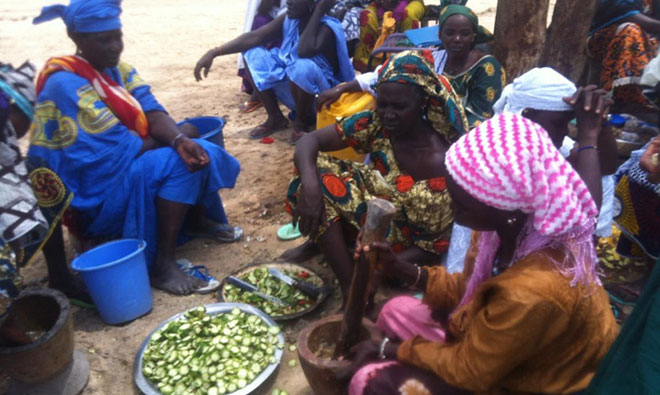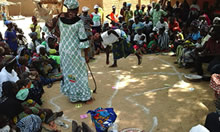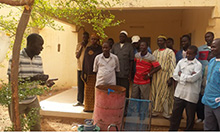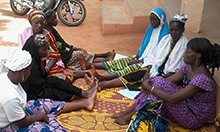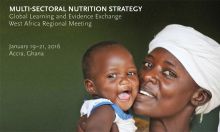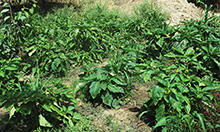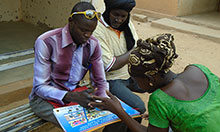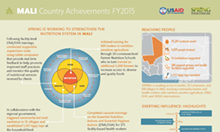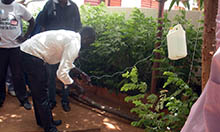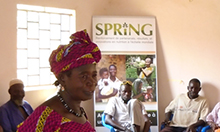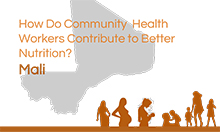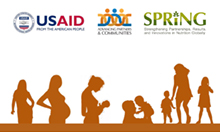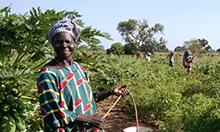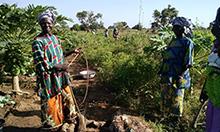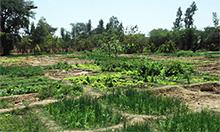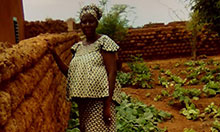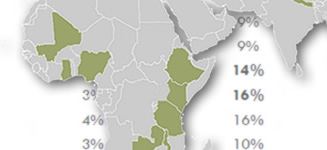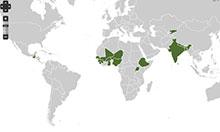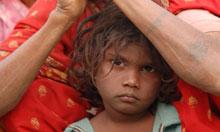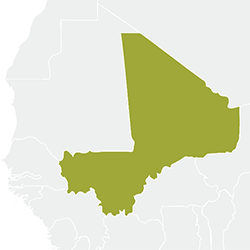 SPRING’s work in Mali aimed to improve the nutritional status of vulnerable women and children by promoting the adoption of Essential Nutrition Actions and Essential Hygiene Actions, improving the quality delivery of nutrition-specific interventions within health services, increasing the availability and consumption of nutritious and diverse diets through community gardens and income-generating projects (Farmer Nutrition Schools), and by mobilizing communities to reach Community-Lead Total Sanitation. SPRING/Mali worked in 20 communes in the Feed the Future zone of influence in Mopti Region.
SPRING’s work in Mali aimed to improve the nutritional status of vulnerable women and children by promoting the adoption of Essential Nutrition Actions and Essential Hygiene Actions, improving the quality delivery of nutrition-specific interventions within health services, increasing the availability and consumption of nutritious and diverse diets through community gardens and income-generating projects (Farmer Nutrition Schools), and by mobilizing communities to reach Community-Lead Total Sanitation. SPRING/Mali worked in 20 communes in the Feed the Future zone of influence in Mopti Region.
SPRING’s main partners in Mali included the Ministry of Rural Development, the Ministry of Health and Hygiene, UNICEF, CARE, the World Vegetable Center (AVRDC), International Crop Research Institute for the Semi-Arid Tropics (ICRISAT), Institut de l’Economie Rurale (IER) and the USAID-funded Livestock for Growth (L4G) project.
In its 15 months, SPRING/Mali reached its target communes at a large scale, running trainings that resulted in over 4,500 handwashing stations, training over 500 community leaders in farmer nutrition schools, and reaching over 8,500 villagers with critical hygiene information. In total, over 165,723 community members were reached through SPRING/Mali nutrition-specific and nutrition-sensitive services.
 L'action de SPRING au Mali a visé à améliorer l'état nutritionnel des femmes et des enfants vulnérables en promouvant l'adoption des Pratiques de nutrition essentielles et des Pratiques d'hygiène essentielles, en améliorant la qualité des interventions spécifiques à la nutrition au sein des services de santé, en accroissant la disponibilité et la consommation de régimes nutritifs et diversifiés à travers des jardins communautaires et des projets générateurs de revenus (écoles de nutrition pour les agriculteurs), et en mobilisant des communautés pour atteindre le but de Community-Led Total Sanitation (assainissement total par la communauté). SPRING/Mali a travaillé dans 20 communes dans la région de Mopti, un région dans la zone d'influence Feed the Future.
L'action de SPRING au Mali a visé à améliorer l'état nutritionnel des femmes et des enfants vulnérables en promouvant l'adoption des Pratiques de nutrition essentielles et des Pratiques d'hygiène essentielles, en améliorant la qualité des interventions spécifiques à la nutrition au sein des services de santé, en accroissant la disponibilité et la consommation de régimes nutritifs et diversifiés à travers des jardins communautaires et des projets générateurs de revenus (écoles de nutrition pour les agriculteurs), et en mobilisant des communautés pour atteindre le but de Community-Led Total Sanitation (assainissement total par la communauté). SPRING/Mali a travaillé dans 20 communes dans la région de Mopti, un région dans la zone d'influence Feed the Future.
Les principaux partenaires de SPRING au Mali comprennaient le Ministère du développement rural, le Ministère de la santé et de l'hygiène, l'UNICEF, CARE, World Vegetable Center (AVRDC), International Crop Research Institute for the Semi-Arid Tropics (ICRISAT), l'Institut de l’Économie Rurale (IER), et le projet Livestock for Growth (L4G) financé par l’USAID.
Pendant 15 mois actives, SPRING/Mali a travaillé à grande échelle dans les communes cibles : plus que 500 chefs communautaires ont participé à des formations aux écoles de nutrition pour les agriculteurs. D'autres formations ont atteint plus que 8.500 villageois avec des informations d'hygiène essentielles et ont provoqué la construction de plus de 4.500 points de lavage des mains. En somme, SPRING/Mali a fourni des services spécifques à la nutrition et sensibles à la nutrition à plus que 165.723 membres des communautés.
